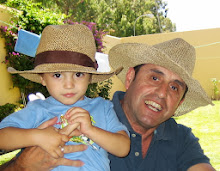"Thirty days hath September..." is a mnemonic rhyme to help remember the number of days in each month. Although there are many versions, this is probably the most common one:
"Thirty days hath September,
April, June and November,
all the rest have thirty-one
except for February alone,
which has twenty-eight or
twenty-nine in each leap year"
April, June and November,
all the rest have thirty-one
except for February alone,
which has twenty-eight or
twenty-nine in each leap year"
Have you ever used the knuckles of your hands to remember them. Do you know how it goes? Read here to find out.
How much do you know about "leap years"? Which was the last leap year? Some people believe that leap years are very special -they're certainly one day longer!! It might be a coincidence but Olympic Games always take place on leap years.
Whenever I speak about leap years I think back of my aunt Elia. I remember when I was a little boy she always looked really young to me, much younger than the rest of the family. One day I asked her what her secret was for looking so young. And she said: "There's no secret, I simply was born on a leap year, on February 29th, and therefore I only have a birthday every four years... that's why I look so young." 
Here are some other curiosities about the calendar.
Have a look at this video.
















